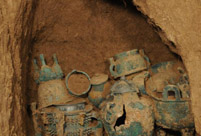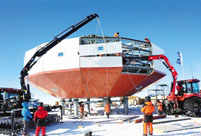BEIJING, Feb. 24 -- China is building a national thinktank on South China Sea research to boost the country'smaritime power strategy and deal with looming maritimedisputes. Established in October 2012, the CollaborativeInnovation Center for South China Sea Studies, based atNanjing University in Jiangsu province, is among the 14national-level research projects prioritized andsupported by the government since 2011.
Hong Yinxing, chairman of the board for the center, saidit was established to meet the country's strategic demandto safeguard maritime rights and interests, developresources and energy, and promote regional peace anddevelopment.
Covering 3.5 million square kilometers, the South ChinaSea is home to vast natural resources — including oil andgas — and gathers major international maritime routes.China said it has indisputable sovereignty over the SouthChina Sea islands and their adjacent waters, includingthe Nansha Islands.
Since the 1970s, several countries in the region havechallenged China's sovereignty over the islands. ThePhilippines has hyped and exaggerated the disputes inrecent years to fan regional tensions.
Hong, who is also Party chief of Nanjing University, saidthe complexity of the maritime issue has required thecountry's research sector to eliminate barriers among thesubjects and agencies to improve efficiency.
The center should also play a leading role in figuring outthe key mid-and-long-term projects, and in building acooperation mechanism to gather efforts from differentresearch fields, the military and those agencies that needthe information, Hong said.
Based in Nanjing University, the center has alreadyattracted top researchers to conduct studies on acomprehensive range of issues regarding the SouthChina Sea and to provide supporting information andpolicy advice.
"The center will become a high-end think tank for SouthChina Sea policymaking, a dialogue platform forinternational communication, and a training center foroutstanding talents on maritime affairs," Hong said.
The university has a long history of studying the SouthChina Sea. It helped the then-Kuomintang governmentdecide on maritime borders in the sea and give Chinese,English and French names to the various islands in the1940s.
The university has cooperated with other researchagencies in providing more comprehensive informationon the South China Sea than any other think tank.
The center has built cooperative relationships withcounterparts in Taiwan that have abundant historicaldocuments on the sea. The center has also worked withcounterparts in countries such as the United States.
So far, the new think tank has accomplished a range ofstudies, including examples of joint maritimedevelopment, law enforcement, and internationalarbitration case regarding the Philippines.
Hong said the center has built up a new model of thinktank that is devoted to basic research but will respond tothe country's emergency strategic demands. It is alsopushing forward the exploration of translating itsscientific research into market products.
【1】 【2】

 Chinese Dream: the Chinese Spirit and the Chinese Way
Chinese Dream: the Chinese Spirit and the Chinese Way 51 bronze sacrificial utensils unearthed in Shaanxi province
51 bronze sacrificial utensils unearthed in Shaanxi province Most gorgeous female celebs in Chi-pao
Most gorgeous female celebs in Chi-pao Second round of test kicks off at Beijing Film Academy
Second round of test kicks off at Beijing Film Academy Ancient Qiang people had vertically grown teeth
Ancient Qiang people had vertically grown teeth Top 10 Chinese youth’s favorite seaside destinations
Top 10 Chinese youth’s favorite seaside destinations Traditional Tibetan clothing tailors
Traditional Tibetan clothing tailors In photos: Unveiling Taishan station
In photos: Unveiling Taishan station Beautiful moments of family reunion
Beautiful moments of family reunion Chinese warplanes C919 to appear at Singapore Airshow 2014
Chinese warplanes C919 to appear at Singapore Airshow 2014 Ruins of Shang Dynasty's structure unearthed in Shaanxi
Ruins of Shang Dynasty's structure unearthed in Shaanxi  Intercity high speed train in operation
Intercity high speed train in operation Severe coldness freezes large parts of China
Severe coldness freezes large parts of China  Beautiful moments of Sochi
Beautiful moments of Sochi  It's not just performing this year
It's not just performing this year

No comments:
Post a Comment